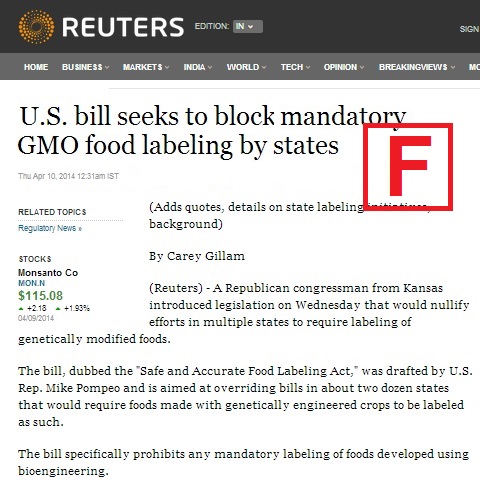Reuters’ Gillam earns failing grade, again, for coverage of GMO science issues
US Rep. Mike Pompeo (R-Kansas) today introduced legislation that would recognize the federal government’s authority to determine if mandatory GMO labels should be applied to foods, to require FDA to review GMO-containing foods prior to marketing, and to define the word “natural” as applied to foods. Reuters carried a story on the proposed legislation written by Carey Gillam. Academics Review has assigned low grades in the past due to Ms. Gillam’s inaccurate reporting on GM foods which reflects a clear bias (academics-review.bonuseventus.org/2014/03/grading-the-science-usdas-economic-research-report-coverage-by-reuters/). In her April 9, 2014 report on the proposed legislation Ms. Gillam claimed “But there are also many scientific studies showing links to human and animal health problems, and many indicating environmental damage related to GMO crops.”
This statement is simply factually incorrect:
1. There are many scientific studies that show that GM crops are safe
2. There are a handful of discredited and flawed scientific studies that claim GM crops are not safe but these have been widely rejected by the scientific community
3. There is a broad scientific consensus, supported by 18 years of real-world experience by tens of millions of farmers who have planted billions of acres of GM crops, that GM technology presents no new or different risks and is as safe as, or is safer than other modalities of breeding. The vocal misrepresentation of fact by a few well funded hardcore dissidents by whom Ms. Gillam’s views are apparently informed do not change these facts.
4. Ms. Gillam also claims “Notably, millions of acres of U.S. farmland have developed weed resistance due to heavy use of crops that have been genetically altered to withstand dousings of Monsanto’s Roundup herbicide, and the subsequent heavy use of Roundup.” As is true with all herbicides, weeds with elevated resistance to glyphosate have emerged and have caused concern in 15-40% of planting locations, the challenge this presents to farmers can be controlled by better stewardship practices. The claim that crops are doused with Round-Up is emotionally loaded but equally inaccurate.
For these reasons Academics Review have to assign this report a grade of F.
Additional review in support of this assessed grade:
Reprinted here with the author’s permission from the Information Technology & Innovation Foundation.
REUTERS (PREDICTABLY) GETS IT WRONG. AGAIN.
One of the reasons the “controversy” over crops improved through biotechnology persists, is because it is manufactured and sustained by a well-organized, ongoing campaign, funded and sustained by vested interests. This astroturf campaign is fueled by credulous and disengaged journalists who recycle their press releases, and allow those biases to bleed over into other coverage.
We’ve written before about one repeat offender, Carey Gillam, of Reuters. She’s back with more of the same, in a story that ran on 9 April covering legislation introduced in Congress that would (redundantly) preempt state legislation to mandate labels that would mislead consumers and abet fraudulent marketing campaigns. Gillam writes “But some scientific studies warn of potential human and animal health problems, and GMO crops have been tied to environmental problems, including rising weed resistance. Millions of acres of U.S. farmland have developed weed resistance due to heavy use of crops that have been genetically altered to withstand dousings of Monsanto’s Roundup herbicide.”
Hold the weed/herbicide resistance issue for a moment, and let’s look at the “scientific studies that warn of potential human and animal health problems…” This claim is false, and flagrantly so. Gillam has been called on this before, yet she continues to recycle the falsehood. It bears repeating: there is not a single credible study showing any health or safety problem with any of the foods or animal feeds on the market derived from crops improved through biotechnology. Not one. FDA’s evaluation of each and every one can be found here. Gillam obviously cannot be bothered, but it makes for illuminating (if soporific) reading. Professional opponents of agricultural biotechnology, whose water Gillam reliably carries, argue that the FDA consultation process is “voluntary.” This, too, is a canard we’ve previously addressed, one which ignores that the same products have been subjected to equivalent, mandatory reviews in the EU, Japan, Australia, Canada, and other countries around the world. Gillam also ignores the recent reaffirmation from the FDA Commissioner that these foods are safe, and that FDA labels give consumers everything bit of scientifically defensible information about the safety and nutritional value of these foods.
The repeated citing of these false claims ignores the robust global consensus on the safety of crops improved through biotechnology, and recycles the canard that the science is undecided; that the published studies demonstrating the safety of these crops are counterbalanced by credible scientific publications suggesting otherwise. This is bogus, and after the last time Gillam ran it, we called her on it. That lead to an email exchange.
I challenged her to back up what she had written, and asked her to provide examples of the scientific papers she claims credibly support the notion that there are genuine safety issues here. . “I’d love to know what papers you think credibly support the claims you reported. Why not bring them on and let’s see what they are… But I could be wrong. If you have data, stand behind it. If not, I can provide you plenty of data on which a balanced journalist could base a correction.”
She responded “…The scientific literature showing a variety of health and environmental concerns surrounding the use of GMOs is out there. I have not just read the studies and made copies, but talked to scientists in several different countries about their concern.” Conspicuously absent from her response was any mention of just which studies these are. Perhaps because she knows she can’t cite any that haven’t been rejected by the scientific community or retracted by the journals in which they were published by mistake. Pressed further, instead of providing any examples of these mythical studies, she resorted to the shill gambit (hurling accusations that the views one disagrees with are bought and paid for, and thus do not have to be dealt with on their merits) thus conceding the argument.
As for biotech improved crops being “tied to environmental problems, including rising weed resistance. Millions of acres of U.S. farmland have developed weed resistance due to heavy use of crops that have been genetically altered to withstand dousings of Monsanto’s Roundup herbicide…” there are several points to be made.
The first is that the evolution of resistance/tolerance is completely unsurprising. In fact, “The First Journal Article on Insecticide Resistance was Published 100 Years Ago this Month”. Gillam may be shocked to discover gambling in the casino, but it’s been known for some time. And experts in weed management have known about glyphosate tolerant weeds for some time as well, and they don’t fit comfortably into activist story line Gillam dutifully parrots. Never mind that farmers don’t “douse” weeds with glyphosate, or anything (why not? It costs money, and dousing is unnecessary, wasteful and expensive.) The bottom line is that the resistance issues are most severe in the fields of farmers who failed to follow the recommended and established best practices, and went instead year on year using only one method of weed control, eschewing the rotation and alternation of crops and weed control methods called for by long experience. The result is neither a new problem, nor one that cannot be managed. As any chef can tell you, the kitchen knife needs sharpening from time to time, and every so often one must buy a new one.
Others have noted Gillam’s repeated offenses in this area. Sadly, it seems nothing will change until something changes. Perhaps it’s time for her editors to move her to a beat that would give her less opportunity to exercise the prejudices she is obviously unwilling to check.
Contributor L. Val Giddings, Ph.D. (Genetics, Evolutionary Biology). Dr. Giddings is a senior fellow at the Senior Fellow at Information Technology & Innovation Foundation.
Filed Under: Grading Science








